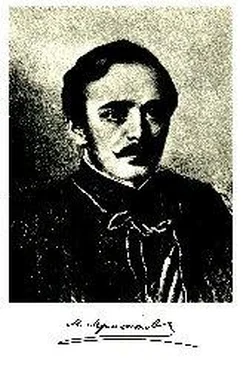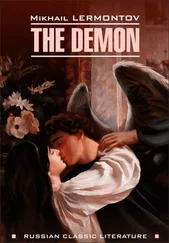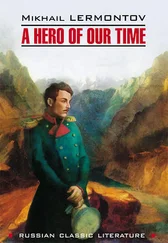When I awoke, it was dark outside. Unfastening my jacket, I sat at an open window-and the breeze from the mountains cooled my breast, which was not yet becalmed even by the sleep of heavy fatigue. Far away beyond the river the lights of the fort and the village twinkled through the thick crowns of the overshadowing lindens. The courtyard was deadly still, and in the Princess Ligovskaya's house all was in darkness.
The doctor entered. His brow was furrowed, and contrary to his usual practice he did not offer me his hand.
"Where have you come from, doctor?"
"From Princess Ligovskaya's. Her daughter is ill-nervous breakdown... But that's not why I am here. The trouble is that the authorities are beginning to suspect, and though nothing definite can be proved I would advise you to be more cautious. The princess just told me that she was aware you fought a duel over her daughter. That old man-what's his name?-told her. He witnessed your altercation with Grushnitsky in the restaurant. I came to warn you. So goodbye-perhaps we will not see each other again-very likely you'll be sent away."
He paused on the threshold. He wanted to shake my hand. And had I given him the slightest encouragement he would have flung himself on my neck, but I remained as cold as a stone, and he went away.
That is just like human beings! They are all alike; though fully aware in advance of all the evil aspects of a deed, they aid and abet and even give their approval to it when they see there is no other way out-and then they wash their hands of it and turn away with disapproval from him who dared assume the full burden of responsibility. They are all alike, even the kindest and wisest of them!
The following morning, when I had received orders from my superiors to report at the fort of N-, I dropped in at Princess Ligovskaya's to say goodbye.
Princess Ligovskaya was taken aback when in reply to her question whether I had anything important to tell her I merely said that I wished her all the best, and so forth.
"I must have a very serious talk with you, however."
I sat down without saying a word.
She was obviously at a loss how to begin. Her face turned red and she drummed her pudgy fingers on the table. Finally she began haltingly: "Monsieur Pechorin, I believe you are an honorable man."
I bowed.
"I am even certain of it," she continued, "though your conduct has been somewhat questionable. You may have your reasons, however, of which I am not aware, and if so, you must share them with me now. You protected my daughter's reputation, engaged in a duel on her behalf, and risked your life in doing so... Pray do not reply, for I know you will not admit it because Grushnitsky is dead." (She crossed herself.) "God forgive him, and you too, I hope! That is none of my concern... I have no right to condemn you, for it was my daughter, blameless though she is, who was the cause. She has told me everything... everything, I am sure. You have declared you love her, and she has confessed her love for you." (Here the princess drew a deep sigh.) "But she is ill and I am certain that it is not an ordinary malady. Some secret grief is killing her-she doesn't admit it, but I am certain that you are the cause... Listen to me: you perhaps think that I am after rank and immense riches-if so, you are mistaken. I seek only my daughter's happiness. Your present position is unenviable, but it may mend. You are wealthy. My daughter loves you, and her upbringing is such that she can make her husband happy. I am rich, and she is my only child... Tell me, what is it that is stopping you? I would not have told you all this, but I rely upon your heart and honor-remember that I have only one daughter... only one. . ."
She began to sob.
"Princess," I said, "I cannot answer you-allow me to speak to your daughter alone."
"Never!" she cried, rising from her chair in great agitation.
"As you wish," replied I, preparing to leave.
She thought it over, motioned me to wait, and left the room.
Some five minutes passed; my heart pounded, but my thoughts were orderly and my head cool. Search as I might in my heart for even the tiniest spark of love for the charming Mary, my efforts were hopeless.
The door opened and she entered. Heavens! How she had changed since I saw her last-and that but a short while ago!
When she reached the middle of the room, she swayed. I leapt to her side, offered her my arm and led her to an armchair.
I stood facing her. For a long time neither of us said a word. Her big eyes full of ineffable sorrow seemed to search mine for something akin to hope. In vain her pale lips tried to smile. Her delicate hands folded on her knees were so fragile and transparent that I began to feel sorry for her.
"Princess," said I, "you know I have mocked you, do you not? You must despise me."
A feverish red colored her cheeks.
"Hence, you cannot love me..." I continued.
She turned away, leaned her elbows on the table and covered her eyes with her hand, and I thought I saw tears glistening in them.
"Oh God!" she said scarcely audibly.
The situation was growing unbearable. In another minute I would have thrown myself at her feet.
"So you see for yourself," I said in as steady a voice as I could, forcing a smile, "you see for yourself that I can't marry you. Even if you wished to do so now, you'd regret the decision very soon. The talk I had with your mother compels me to speak to you now so frankly and brutally. I hope she is mistaken, but you can easily undeceive her. As you can see I am playing a most contemptible and disgusting role in your eyes, and I admit it-that is the most I can do for you. However bad your opinion may be of me, I'll accept it. You see I am abasing myself before you... Even if you did love me, you would despise me from this moment-now, wouldn't you?"
She turned to me a face as white as marble but with eyes flashing wondrously.
"I hate you..." she said.
I thanked her, bowed respectfully and walked out.
An hour later a stage coach troika was carrying me rapidly from Kislovodsk. A few miles from Essentuki I saw the carcass of my spirited steed by the roadside. The saddle had been removed-probably by some passing Cossack-and in its place two ravens now sat. I sighed and turned away...
And now, here in this dreary fort, as my mind dwells on the past, I frequently ask myself: why did I not wish to tread the path fate held open to me with a promise of tranquil joys and peace of mind? No, I could never have reconciled myself to such a fate. I am like a mariner born and bred on board a buccaneer brig whose soul has become so used to storm and strife that, if cast ashore, he would weary and fade away, no matter how alluring the shady groves and how bright the gentle sun. All day long he walks up and down the sandy beach, listening to the monotonous roar of the breakers and looking into the hazy distance to catch, in the pale strip dividing the blue deep from the gray clouds, the flash of the long-awaited sail that at first is like the wing of a seagull and then gradually stands out from the white of the spray, as it steadily makes for its lonely anchorage...
I happened once to spend two weeks in a Cossack village on the left flank. A battalion of infantry was stationed there, and the officers used to meet at each other's quarters in turn, playing cards in the evenings.
One time at Major S-'s, having tired of boston [110] card game like bridge.
, we threw the cards under the table and sat on talking until late, for this time the conversation was interesting. We were discussing the Moslem belief that the fate of man is preordained in heaven, which was said to find many adherents among us, Christians, too. Each of us had some unusual occurrences to relate pro or contra.
Читать дальше

![Михаил Лермонтов - A Hero of Our Time [New Translation]](/books/27671/mihail-lermontov-a-hero-of-our-time-new-translati-thumb.webp)










